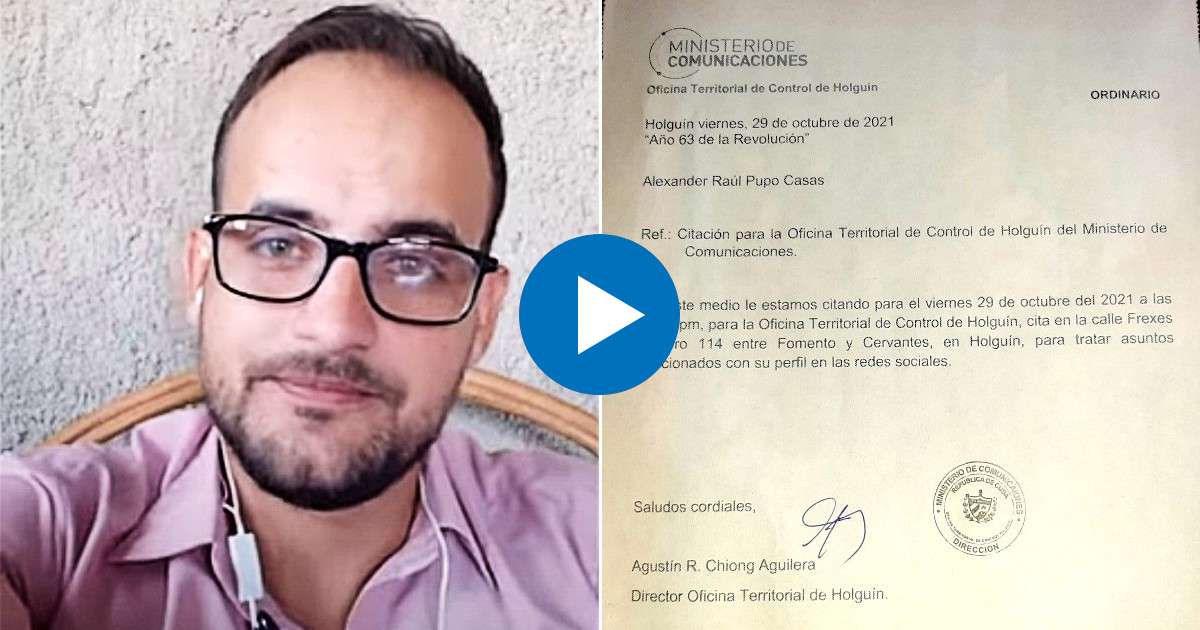
The Cuban doctor, Alexander Pupo Casas, refused to attend the summons sent to him this Friday by the Ministry of Communications (MINCOM) to hold an “interview” with the purpose of addressing "matters related to your social media profile".
“The director of the territorial office in Holguín cannot summon a citizen, he has no authority to do so,” explained the doctor in a direct message on his social networks in which he explained that he would not attend the summons because he considered it illegal and illegitimate, both for the six-hour period they were given to appear, as well as for the lack of authority of said public official to issue this type of summons.
“We are hereby summoning you for Friday, October 29, 2021 at 02:00 pm, to the Territorial Control Office of Holguín, appointment at 114 Frexes Street between Fomento and Cervantes, in Holguín, to discuss related matters. with his profile on social networks,” indicated the summons received by Pupo Casas, written in identical terms to those received by other activists who on their social networks have commented or published content related to the Civic March for Change called by civil society for 15N.
In his message, the doctor explained that, instead of attending the “interview” called by Agustín Chiong Aguilera, director of the Holguín territorial office, he went to the provincial Prosecutor's Office to file a complaint against the MINCOM official. Likewise, he indicated that he does not rule out initiating legal action against this official, as well as suing the company. ETECSA for breach of contract.
“At first I thought about attending the summons, but after discussing it with lawyers I decided that I would not go, because this official does not have the authority to issue this type of summons. In any case, it is not mandatory to attend, since it does not have any jurisdictional authority," explained the doctor.
The MINCOM has no power to regulate or monitor the content of its publications on social networks, protested the doctor from Holguín, known for his very active critical profile through these.
“The social networks that I use are not property of Cuba, only the internet line that I pay punctually, and very expensive,” said Pupo Casas, who denounced that, despite him complying with the conditions of the contract, the company ETECSA - which monopolizes telephone and internet services in Cuba and is controlled by GAESA and State Security - cuts off the service without offering explanations.
For this reason, he announced that he plans to file a complaint against ETECSA for breach of contract and demanded that the company respect his rights as a client, user and Cuban citizen with rights. “I pay punctually for the service. I demand that the telephone services that I contracted keep working without any problems as long as I pay for them,” he said.
The activist, who has been a victim of harassment and repression by the repressive forces of the Cuban regime, stated that he knew their strategies and that he was not afraid of them, nor would they be able to silence him. In that sense, he recommended that Cubans always act as people with rights, that they demand them and that they legally report any violation of them before the courts, even if it later remains a dead letter.
“When the Cuban understands that the government works for us and not the other way around, then Cuba will have the possibility of changing,” argued the doctor, who has been detained, sanctioned and threatened by the repressive apparatus of the totalitarian regime.
The summons received by Dr. Pupo Casas could be part of a strategy to intimidate civil society. According to him, there are several activists who have received identical summons signed by MINCOM officials from their provinces.
At first, the doctor thought he was being scheduled to apply the Decree Law 35, as has happened with other activists, but gave up the idea of appearing for the “interview” to find out the reasons for it.
“For every opponent you bother, 10 more rise up. I'm not afraid of them. “I will file lawsuits every time they come to me with illegal strategies like this,” he added.
Likewise, he recommended that activists record those telephone conversations that they consider could later be used against them, and thus compare them later with the edited versions. that State Security uses to defame in the official media.
What do you think?
SEE COMMENTS (2)Filed in: